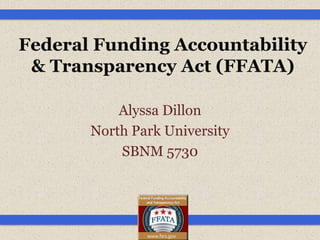
Ffata presentation dillon
- 1. Federal Funding Accountability & Transparency Act (FFATA) Alyssa Dillon North Park University SBNM 5730
- 2. History • Introduced on April 6, 2006 as S. 2590 by Tom Coburn, Barack Obama, Tom Carper and John McCain. • 43 others co-sponsored this bill (S. 2590, 2006). • A “secret hold” was placed on this bill, which would have prevented it from reaching the Senate floor. The secret of who placed this hold went viral in the blog world until Sen. Stevens finally admitted it was his hold (Koppel et al., 2006). •The bill was passed by Senate on September 7, 2006 (S. 2590, 2006).
- 3. History • Sister bill, H.R. 5060 was passed by the House, but it was weaker so the Senate did not pass this bill. •The House‟s awareness of this similar bill helped to expedite the passing of S. 2590 (H.R. 5060, 2005). • S. 2590 was introduced to the House on September 8, 2006 and was passed five days later (S. 2590, 2006).
- 4. Becoming a Law President George W. Bush signed the bill into law on September 26, 2006 – as seen in the photo below (S. 2590, 2006).
- 5. About FFATA • This bill was signed to empower every American with the ability to hold the government accountable for each spending decision. •This bill will increase transparency for the over $1 trillion in federal awards (U.S. Government Accountability Office, 2010). • The Office of Management and Budget established a centralized and accessible database (www.USASpending.gov) in 2007 to access this information.
- 6. About FFATA To achieve greater transparency, the act requires the database to provide the following information about each federal award: • Name of entity receiving award • Amount of award • Type of award (e.g., grant, loan, contract) • Agency funding award • A North American Industry Classification System (NAICS) code of the recipient or a Catalog of Federal Domestic Assistance (CFDA) number (where applicable) • Program source • Award title that describes the purpose of the funding • Location of recipient • City, state, congressional district, and country in which award performance primarily takes place • Unique identifier for entity receiving award and of the parent entity of recipient, if one exists • Any other information specified by OMB (Hatch, 2006).
- 9. Impact on Non Profit Organizations • FFATA requires information on federal awards (federal financial assistance and expenditures) be made available to the public via a single, searchable website. • Federal awards include grants, loans, awards, cooperative agreements and other forms of financial assistance as well as contracts, subcontracts, purchase orders, task orders, and delivery orders.
- 10. Impact on Non Profit Organizations • The centralized website allows for citizens and watchdog groups to easily access information on federal funding to non-profit organizations. • Many organizations claim they do not receive any city, state or federal funding (such as PAWS Chicago) and this is a way to check these claims.
- 11. Impact on Non Profit Organizations • From the start this bill was widely supported by groups such as PETA, Gun Owners of America and the National Gay and Lesbian Task Force (Hatch, 2006). • Organizations such as these listed above supported this bill as they wanted to encourage this public database that would encourage transparency of federal funding and support for non-profit organizations.
- 12. References Hatch, G. (2006). The Federal Funding Accountability and Transparency Act: Background, Overview, and Implementation Issues. Retrieved from http://www.fas.org/sgp/crs/secrecy/RL33680.pdf. H.R. 5060 (2005). Retrieved from http://thomas.loc.gov/cgi- bin/bdquery/z?d109:HR05060:@@@L&summ2=m& Koppel et al. (2006). Sen. Stevens is „the secret senator.‟ CNN. Retrieved from http://www.cnn.com/2006/POLITICS/08/30/secret.senators/ S. 2590 (2006). Retrieved from http://www.gpo.gov/fdsys/pkg/BILLS- 109s2590is/pdf/BILLS-109s2590is.pdf. U.S. Government Accountability Office. (2010). Implementation of the Federal Funding Accountability and Transparency Act of 2006. Retrieved from http://www.gao.gov/products/GAO-10-365
Hinweis der Redaktion
- How detailed is the database?
- Why did these types of org. support the bill?